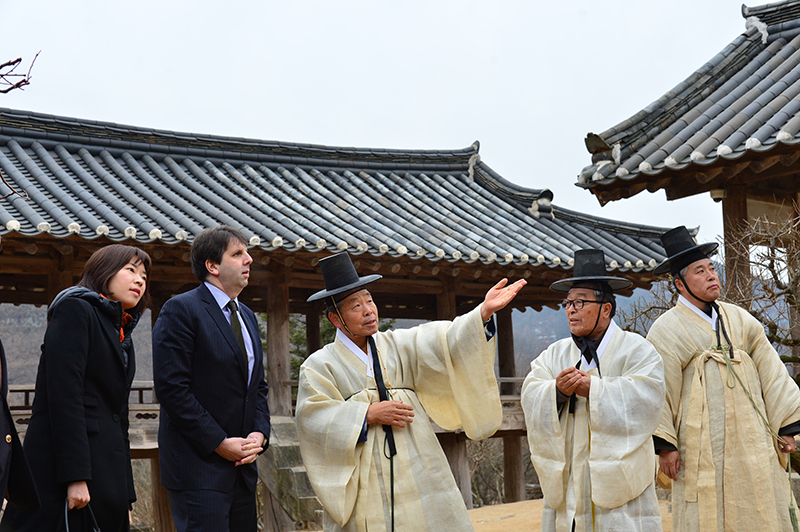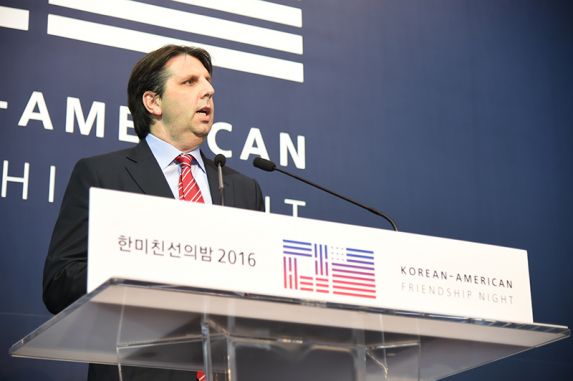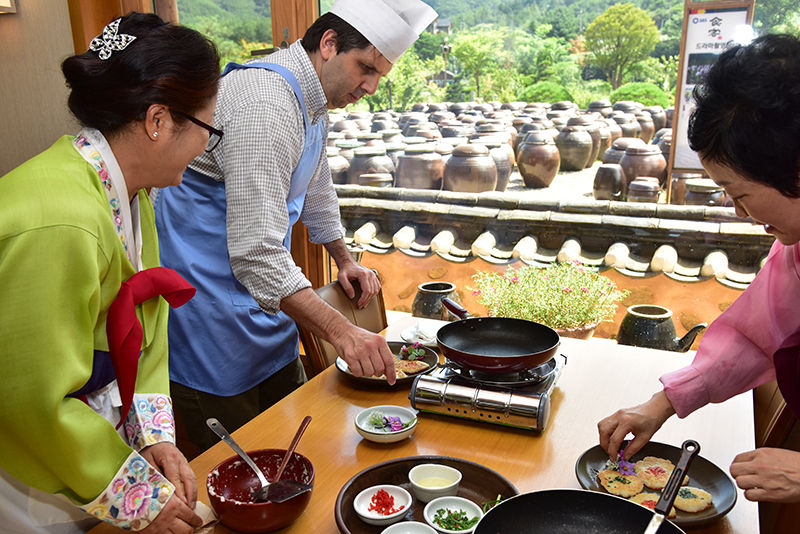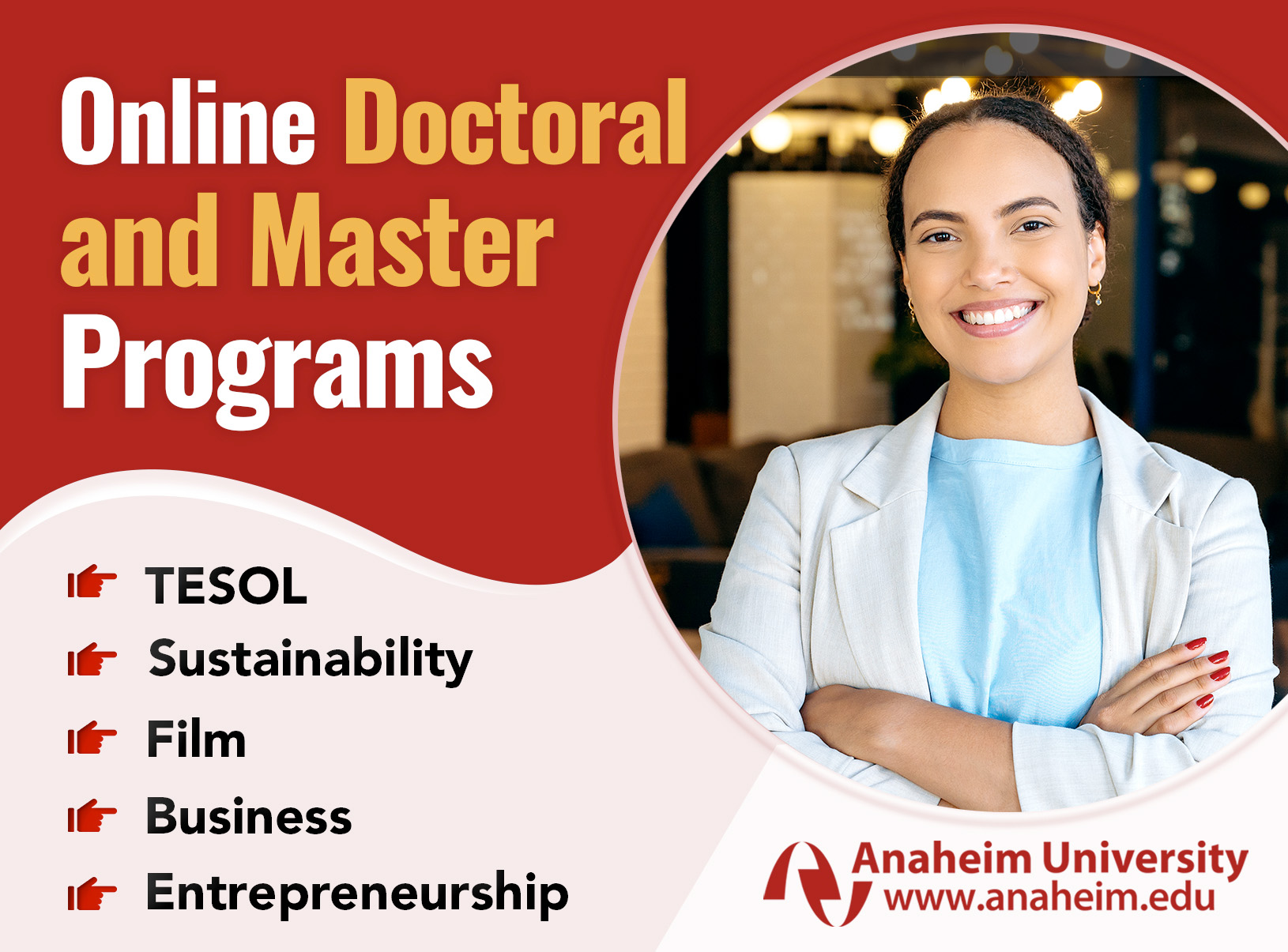U.S. Ambassador to the Republic of Korea: Building Lasting Relations
When it comes to international relations, Mark Lippert, U.S. Ambassador to the Republic of Korea, comes with a wealth of experience. He has served as a foreign policy advisor to various Senators and Senate Committees, including his work as the Foreign Policy Advisor for then-Senator Obama from 2005 to 2008. After Mr. Obama was elected as president, Mr. Lippert served him as Deputy Assistant to the President and Chief of Staff for the National Security Council. Mr. Lippert left Washington from 2009 to 2011 to be on active duty in the United States Navy, and upon his return, held senior positions in the Department of Defense. In 2014, he was appointed as the United States Ambassador to the Republic of Korea. Since then, he has served his country as a representative to build and maintain peaceful relations between the two countries. On March 5th, 2015 during an event organized by the Korean Council for Reconciliation and Cooperation, which advocates peaceful reunification between North and South Korea, a man named Ki-Jong Kim, who was protesting annual joint military drills between South Korea and the U.S. military, slashed Ambassador Lippert in the face and jaw shortly before the ambassador was supposed to give a speech. The gash required 80 stitches. In addition, the ambassador was also slashed five times on his left arm and hand. Ki-Jong Kim was sentenced to 12 years in prison for attempted murder, assaulting a foreign envoy and business obstruction. Adding on to the ambassador’s expertise in international relations and diplomacy, Mr. Lippert brings a personable approach to his position; his fast acquisition of the Korean language, his love of walking in the streets of Seoul, and his social media accounts that share his daily life in Korea show the endearing personality he brings to his job. He currently resides in Seoul with his wife, Mrs. Robyn Lippert, his son, Sejun Lippert, and a pet dog, Grisby, a lovable basset hound who has his own Twitter account. Seoul Journal Executive Editor Anthony Al-Jamie about his experience as an ambassador and his experience in Korea.
SJ: What led to your interest in international relations and diplomacy?
LIPPERT : Growing up, I was interested in being a lawyer and I had always set out to go to law school after graduating. However, during the last couple of years of college at Stanford University, the ideas, people, and places I was exposed to sparked an interest in international relations, especially in Asia, and development issues in Southeast Asia. Ultimately, I ended up going to Beijing University to study abroad, and that really led me down the path of developing an interest in foreign relations and diplomacy.
SJ: What were your early interests during your childhood and adolescence?
LIPPERT: I had a pretty simple childhood. I was very interested in sports;I played baseball, basketball, and football. I also read a great deal, and was very interested in reading and literature. My favorite book in junior high was Great Expectations by Charles Dickens. I think my interest in reading came from my mother. Eventually, I started thinking about going to law school. My father was a lawyer and I was interested in what he was doing. I remember I would sometimes go to work with him at night; I would do my homework while he worked on legal briefs.
SJ: Tell us a bit about your experience as an ambassador.
LIPPERT: There is an expression in Korean, }그때그때달라요,” (geuttaegeuttaedallayo)which means every day is different. This is an accurate description of the daily work of an ambassador. You are involved in virtually every aspect of the relationship between the Republic of Korea and the United States. Yet, there is always something that surprises you, always something new, always something different. I think the most important thing that I have learned as an ambassador is “be ready.” Be ready for surprises, be ready for fun, be ready for engagement, and be ready for interesting life experiences.

SJ: Of all roles in your career before becoming an ambassador, what do you think benefitted you most in becoming the person you are now?
LIPPERT: You rightly point out that I have had a range of jobs, and served in various positions, before I became an ambassador. I think that the variety of previous jobs in the U.S. government—working in the Senate, working at the Pentagon, working in the White House, working in the uniformed military—really helped prepare me for this job, because this position requires versatility, agility, and the ability to make quick, tough decisions about issues with which you at times only have imperfect information. The range of experiences before taking this job was the primary element that has helped me the most in my current position.
SJ: What are your primary duties as ambassador to South Korea?
LIPPERT: You are the President’s personal representative to the Republic of Korea, the senior ranking official. With that comes a range of duties. First, there are critical policy issues involving the bilateral relationship: security, economy, our global diplomatic partnership with the Republic of Korea, our people-to-people diplomacy, our “New Frontiers”—cooperation going forward in cyber, space, energy, environment, and global health. These policy issues take up a good deal of time and are extremely important. Second, you have important representational responsibilities. You represent the country of the United States, you represent the United States people; how you project the image of the United States is a major part of your work. Finally, it is also important to recognize that you are the head of a large American community here in the Republic of Korea. You manage not only the community of U.S. officials working in Korea, but also the businessmen, scholars, and other private Americans who live here and interact and engage. This is also a vital part of the job.
SJ: What do you think are the most challenging aspects of your work?
LIPPERT: The range of challenges here in the Republic of Korea, and the speed at which many of these challenges appear, forces one to be agile, to be nimble, and responsive at almost any hour of any day.
SJ: What do you enjoy most about your work?
LIPPERT: First, it is rewarding to work with the people and the government officials here in the Republic of Korea. It is a great relationship, a great alliance, and has a remarkable history. We are doing great things today, and it has a very bright future. Beyond that, I enjoy involving my family in my activities. My basset hound, Grigsby, has a twitter account (@GrigsbyBasset). My son Sejun accompanies me to many events. Of course, my wife Robyn, who is often busy juggling her own career as a senior vice president of a major U.S. company, is a full, active, and equal partner in all of our diplomatic activities here in the Republic of Korea.
SJ: Could you tell us about some of the most memorable events of your career and life?
LIPPERT: Being admitted to Stanford University was a complete shock to me. I had taken a year off and was working for a legal services corporation in Cincinnati involved in low-income housing issues. I was late coming home from work one day, and my mom was out in the front yard. She is a very mild-mannered Kansan who is usually understated, but she was very excited as I approached. I thought something bad had happened. She said, “You have to come in here!” I had applied to a whole range of colleges, and the applications literally came back all at once. Most, if not all, of them were fat envelopes, which means you have been accepted. They were all sitting there on the dining room table and my mother was, again, very excited. The high point was the Stanford envelope: I very much wanted to go to Stanford. The low point was convincing my father to pay for it! I am kidding about the last issue. Meeting Barack Obama for the first time in his little dingy Senate transition office in the basement of the Senate office buildings, and having a 30-minute interview connecting with him was remarkable. His winning the election was remarkable, and having been a part of that campaign was a special experience .Going to serve in Afghanistan and Iraq as an intelligence officer for the U.S. Navy Seals was also important. There is a whole series of memories there. And finally, there is the experience of being an ambassador. Everything, from the lows—being attacked will always be with me—but also the highs—remembering how the Korean people and the entire country for that matter responded to the attack—will be seared in my memory forever. The myriad of memories that I have acquired in Korea are really remarkable, and I will carry them with me for the rest of my life.
SJ: Can you tell us about your experience working with President Obama?
LIPPERT: I had the fortune of meeting President Obama before he was sworn into the United States Senate. I got to work with him during various parts of his career, in various iterations, from being a staff member in the Senate working with him on the Senate Foreign Relations Committee, to working on the presidential campaign, to when I was a military officer in Iraq—I left the campaign—and just being his friend. He sent me emails. He was concerned. There is the experience at the White House. It was great to watch him assume office and really master the job. Working as part of his administration in senior positions at the Pentagon, and then being his personal representative to a country that I know he cares about, admires, and respects—the Republic of Korea—has been a remarkable experience.
SJ: What are your goals when it comes to the field of diplomacy?
LIPPERT: I think there are many different goals in diplomacy. Some parts of the State Department focus on political issues. Other parts focus on public diplomacy; still, others on economic, consular, and a variety of other issues. I think the key is integration. The ambassador and the deputychief of mission who run these missions must be able to integrate the different elements of diplomacy: the political issues, which tend to get primacy in the State Department, to public diplomacy, to economic, to law enforcement, and others. The integration—in this day and age when things move so fast and the stakes are so high—is a key contribution of ambassadors and deputy chiefs of missions who are working in the field of diplomacy.
SJ: What do you think are the major issues that are obstacles in achieving greater peace between nations?
LIPPERT: Upon coming into office, President Obama in his initial inaugural address—I'm going to paraphrase here—underscored the use of principled diplomacy in solving complex problems and in promoting peace and prosperity in the world. He essentially said that if other nations would unclench their fists, he would extend a hand. Over time, we have seen that happen. The biggest challenge, at times, is finding the partner. We found our interlocutors in Iran, in Cuba, and in Burma. That does not mean that all issues have been resolved, or that challenges, serious challenges, do not remain with those nations. But we were able to make inroads to begin to solve some complicated problems through diplomacy. We have not found that partner in North Korea. They refuse to talk. They declared our bilateral diplomatic channel dead. They declared the Six-Party talks dead. They continue to violate international Security Council resolutions through nuclear missile tests. That does not mean we necessarily have given up on diplomacy, but right now the focus is on sanctions. We are continuing to use sanctions and other measures to press for authentic and credible negotiations to denuclearize the Korean peninsula, and we are hopeful that the North will see the choice that lies before them and come back to the table.
SJ: What are your thoughts on the Sister Cities International program initiated by U.S. President Eisenhower?
LIPPERT: The Sister Cities International program is a fantastic program and there is a range of active partners in South Korea. There are almost 60 sister city relationships and eight sister state relationships, for a total of 68 relationships, which is really remarkable. What is most important is that this builds people-to-people relationships between the United States and the Republic of Korea, which will endure over time. Governments come and go, but the lasting bonds between our two peoples provide the foundation upon which all the other elements of this great relationship are built.
SJ: Do you have much time to relax outside work?
LIPPERT: We find time as a family to go for walks. I like to exercise. We go to a lot of baseball sporting events here in South Korea. We also try to visit all areas of the country and engage with the Korean people, learning about Korean history, learning about Korean culture and the language. Sometimes we do not necessarily get to relax outside of work, but we are able to find relaxing ways to work, and I think that is part of being creative and nimble as a family and as a diplomat here in Korea.
SJ: What do you enjoy most about staying in South Korea?
LIPPERT: The people are amazing, dynamic, hardworking, and busy, but never, never, never too busy to show the great inner warmth that all South Koreans have. It truly is amazing. Beyond the people, I would be remiss if I did not mention the food in South Korea, which is absolutely fantastic, and one of our favorite things. Everything from the street food to high-end cuisine, from traditional Korean to fusion, Korea has it all.
SJ: Are you interested in Korean music or film?
LIPPERT: I have seen some great movies here in Korea. Everything from Ode to My Father(Gukjesijang, 국제시장)to The Admiral: Roaring Currents(Myeongryang, 명량).Obviously, Korean music is fantastic; everything from the traditional forms, which are beautiful and moves your soul, to the more contemporary forms that people know the world around. I would also be remiss if I did not point out that there are great Korean actors and musicians who are crossing over into more traditional western music and film. Their talents, their contributions to music and film outside of what is more traditionally defined as “Korean,” are also remarkable.
SJ: For someone who is interested in understanding Korean culture, what would you recommend in terms of books, film, music, events, etc.?
LIPPERT: It is an endless list – as there are a myriad of tough choices. In the interest of time, let me give you some options that tend to be more on the pop culture side. Ode to My Father is a great movie. It is a pop culture classic that did very well here in Korea. It is also highly entertaining. In terms of film, the annual Busan Film Festival has really become an international destination on the map. In terms of culinary advice, go have some street food in Korea. Go to Gwangjang Market. It is a great place to have some of the simplest yet delicious dishes. In terms of events, there is a range of things. You have to go to a Korean Baseball Organization game; there is nothing like it. Go to the Daegu Chimaek Festival; there is nothing like that as well. Nothing in my view is complete without sampling some of the traditional alcohol and liquors in Korea. They are amazing. One of my favorites is Leegangju, which was actually used when the Chosun Dynasty signed the treaty of amnesty and cooperation with the United States. There is a range of traditional liquors, which are really worth enjoying: hard to find sometimes, but well worth the investment.
SJ: What would be your advice to someone interested in your field of work?
LIPPERT: There is nothing like practicing diplomacy. There is nothing like working for your country. Most ambassadors are career diplomats. If you are interested in a career in diplomacy, check out the State Department website, which offers internships. You can take the Foreign Service test. When I was in graduate school, I did an internship, and it was a fantastic experience. In the interim, while you are thinking about what you want to do — go travel the world, learn a new language, and meet new people. That will all prepare you to be a good diplomat.













